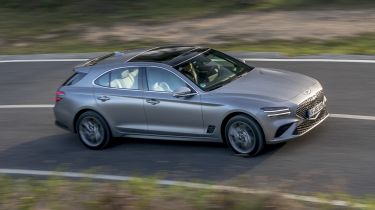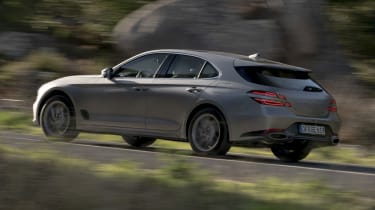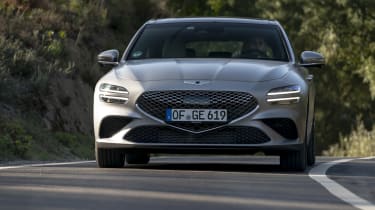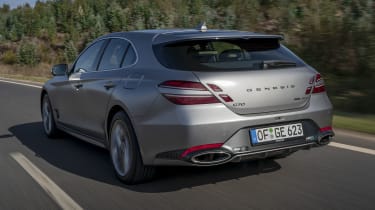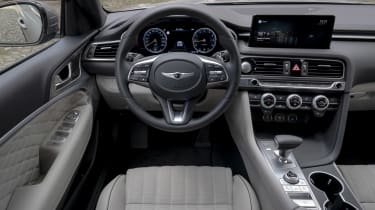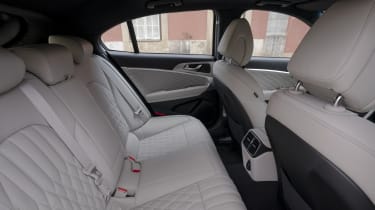Genesis G70 Shooting Brake estate review
“The Genesis G70 Shooting Brake offers more style than substance and seems destined to struggle against the best rivals”
Pros
- Eye-catching design
- Nimble handling
- Impressive digital dials available
Cons
- Smaller boot than rivals
- Slightly dated interior
- Doesn’t feel as quick as stats suggest
Until very recently, you couldn’t buy a Genesis in the UK. Now there are already six different models, with more to come. This one is the Genesis G70 Shooting Brake, a style-led estate that Genesis is pitching at the BMW 3 Series Touring, Mercedes C-Class Estate and Volkswagen Arteon, plus the smaller Mercedes CLA Shooting Brake.
It’s a striking option if you don’t fancy any of its German rivals. The shield-shaped grille is a little unusual but the split headlights and tail-lights certainly make it stand out. At the back, a spoiler swoops right across the tailgate glass in a way that we’ve not seen before.
 Best estate cars on sale in 2025
Best estate cars on sale in 2025
Unlike most of its new models, we’re told that the Genesis G70 is specifically designed for Europe, as European buyers still buy estate cars in relatively decent numbers. That’s backed up by the driving experience, which is pretty good. The car has direct steering and a balanced feel, so should excel on a tight British B-road, while the ride quality is also acceptable.
Genesis is part of the Hyundai and Kia group, and the G70 shares some of its parts with the Kia Stinger. It’s a shame the Genesis won’t get the powerful 3.3-litre V6 petrol engine from the Stinger but it does get the other engines that Kia used to offer in the Stinger. The choice is between a 2.2-litre diesel and a 2.0-litre petrol, which seems a little old-fashioned these days. The G70 really needs an electrified option; the petrol is thirsty.
Practicality isn’t as good as rivals either. The boot is an okay size for a car of this type and is at least much more accommodating than the boot of the Genesis G70 saloon, but we’d like a bit more rear seat space.
More reviews
In-depth reviews
Up front, there’s a similar feel to the Kia Stinger. It looks and feels upmarket but looks a little outdated compared to the newer Genesis GV70 SUV, with its bigger screen and sleeker dashboard design. The G70 Sport Line stands out with lots of red stitching, plus metallic pedals and bigger alloy wheels. Below it, you can choose Premium Line or Luxury Line specifications.
It’s extremely difficult for a new brand to get a foothold in the car market, as evidenced by DS’ slow sales since its separation from Citroen. Genesis hopes to stand out through its customer service; every customer gets a Personal Assistant to help you choose your car, deliver a car to you to test drive (if you’re in the South East of England) and book servicing when it’s required. The brand says it will never ask you to travel to them, which adds to its appeal.
MPG, running costs & CO2
Look at the G70’s rivals and you’ll find that nearly all of them are available as plug-in hybrid models. These types of cars are usually more popular with company-car drivers than private buyers, as a plug-in hybrid offers much lower Benefit-in-Kind tax costs than a regular petrol or diesel car. Both the G70’s engines occupy the top BiK band, so most business users are likely to dismiss the car out of hand.
Private buyers will find the car quite expensive to run too. Even the diesel only manages 41.8mpg and the petrol returns up to 33.1mpg (we got 28mpg on our test drive). The petrol-powered BMW 330i estate achieves up to 40.9mpg. Only the Premium Line model costs less than £40,000 and is subject to the standard rate of VED (road tax); you’ll pay a surcharge on other models, increasing your annual bill to nearly £500 until the car is six years old.
Genesis, like parent company Hyundai, offers a five-year, unlimited-mileage warranty. The Genesis care plan includes servicing for up to five years or 50,000 miles.
Engines, drive & performance
Weighing just 40kg more than the saloon, the Genesis G70 estate is good to drive. We like the keen steering and balanced suspension setup, and grip is impressive - although our test car had four-wheel drive, which UK cars aren’t available with yet. The BMW 3 Series Touring is still the superior choice for keen drivers but the Genesis offers a better driving experience than other rivals.
The G70 is, sadly, let down by the engines available. The 2.2-litre diesel produces 197bhp and gets from 0-62mph in a respectable 7.7 seconds but the noise is more intrusive than other diesel executive cars. Refinement suffers as a result and the diesel isn’t even very economical, so it’s not particularly appealing.
The cheapest Premium Line model gets a 194bhp 2.0-litre petrol engine but its 9.3-second 0-62mph dash isn’t quick. Luxury and Sport Line models get a 241bhp version instead. On paper, this engine appears quick, taking just 6.4 seconds to reach 62mph, but it doesn’t feel quite so rapid in real life and is beaten by a 330i Touring. All cars get an eight-speed automatic gearbox, which is smooth but not always as responsive as we’d like.
Interior & comfort
Genesis is a new brand in the UK but in other parts of the world the G70 has been on sale for several years. Taken in isolation, the interior looks stylish and upmarket but the newer GV70 SUV does feel like a more modern car inside. The dashboard of the G70 looks rather more conventional, with a clearly defined centre console and a comparatively modest 10.25-inch touchscreen perched above it. Unlike the GV70, there’s no rotary dial for the touchscreen and we found the screen to be a little slow to respond.
Thankfully, standard equipment is good. Premium Line, the cheapest of the three trim levels, comes with LED headlights, adaptive cruise control, Apple CarPlay and Android Auto, sat nav, auto high-beam assist and a rear-view camera. Luxury Line adds a heated steering wheel, heated front seats and electronically controlled suspension, while Sport Line adds bigger wheels, a limited-slip differential and racier touches inside and out.
Most of the options are split into packs. The Innovation Pack is tempting, featuring a superb digital instrument cluster, a head-up display, a 360-degree camera, wireless phone charging and adaptive headlights, although it does cost a chunky £3,250.
Practicality & boot space
One of the drawbacks of the G70 saloon is the disappointing rear seat space and the Shooting Brake is little better. Headroom is fine for those under six-foot-tall and there’s a reasonable amount of knee room but the front seats are mounted low and that means there’s not enough space to put your feet underneath. The car’s seemingly high floor also means that your legs are raised off the seat bases, which is unlikely to be comfortable on long journeys.
The rear seats fold individually and can be pushed down by levers in the boot. Keep the rear seats in place and you have 465 litres to fill, which is a little bit down on the 500 litres you get in the BMW 3 Series Touring and Mazda6 Tourer. That increases to 1,535 litres with the seats down if you’re happy to fill to the roof. While the boot’s compact size is disappointing, the main issue is likely to be the small boot opening, with a narrow aperture and a high load lip. You may find it difficult to load bulky items.
The Shooting Brake’s boot space is noticeably better than the G70 saloon. That car offers 330 litres of space and doesn’t have the benefit of a hatchback tailgate.
Reliability & safety
Genesis is too new to be featured in our latest Driver Power owner satisfaction surveys, so it’s too early to see if owners are happy with their cars. Hyundai finished a mid-table 16th out of 29 brands, with value, safety features and infotainment getting good scores, although 21% of owners reported a fault in the first year. Kia, meanwhile, finished second overall, with a similar proportion of owners having to visit the dealership for remedial work.
The Genesis G70 hasn’t been tested by Euro NCAP yet but this year the larger G80 saloon and GV80 SUV were both awarded five stars. Adult and child protection were rated 91% and 87% respectively for both models. All G70 Shooting Brake models have a lot of safety features as standard, including pedestrian and cyclist detection, intelligent speed limit assist and highway driving assist (combining adaptive cruise control with lane-keeping assistance).

